Bio 30 - DNA & Genetics (Multiple Choice)
1/49
There's no tags or description
Looks like no tags are added yet.
Name | Mastery | Learn | Test | Matching | Spaced |
|---|
No study sessions yet.
50 Terms
As the number of trials increase, the ratio of actual results to expected results
a) gets closer
For an individual with genotype Aabb, what genes may have been received from one parent?
b) Ab
In probability, the chance of an independent event occurring:
d) is unaffected by other events
Why were garden peas good experimental organisms for Mendel's experiments? They:
b) can easily self or cross pollinate
NOTE : In peas, yellow seed (Y) is dominant to green seed (y), and round seed (R) is dominant to wrinkled ( r)
How many kinds of gametes could be produced by a YYRr plant?
b) 2
NOTE : In peas, yellow seed (Y) is dominant to green seed (y), and round seed (R) is dominant to wrinkled ( r)
How many kinds of gametes could be produced by a YyRr plant?
d) 4
The genetic makeup of an individual for a trait being studied is called that individual's:
a) genotype
How many heterozygous offspring would you expect if two parents who were heterozygous for a trait produce an F1 generation of 40 individuals?
d) 20
A chemical change in a gene that causes the gene to produce a different effect is called a:
a) mutation
Mendel’s second experiment was a dihybrid cross in which he crosses two pure breeding parents with contrasting forms for two traits. The F1 hybrids all showed the dominant form for both traits. When the F1 was self-pollinated, the F2 offspring showed four phenotypes in the ratio of 9/16:3/16: 3/16: 1/16. Which principle resulted from this experiment?
b) independent assortment
The inheritance of the blood groups A, B, AB, and O is an example of?
a) codominance
What is the relationship between 2 unlike genes of a pair if they both express their effects on an individual’s phenotype?
a) codominance
Mr. Sandival has Type B blood. Mrs. Sandival has type O blood. They have 3 children of their own and one adopted child. Owen has type AB blood, Mary type O, Susie type B and Carl type B. Which child is adopted?
c) Owen
A child with Down syndrome has 22 pairs of normal chromosomes and 3 chromosomes in place of the 23rd pair. This disorder is the result of?
d) nondisjunction in meiosis
Human males have no alleles on their Y chromosome to pair with genes on their X chromosome. Thus, a single recessive gene on the X chromosome is expressed in the male. A trait caused by such a gene is known as?
d) X-linked
A pair of homologous chromosomes carry the gene combination Ab and aB respectively, before meiosis. How can an AB gamete be explained?
a) crossing over
If a TtRr organism produces 1000 gametes and all are Tr or tR, then the two pairs of genes are probably?
a) linkage
The physical characteristics of an organism that you can see are its:
c) phenotype
Two pink-flowering plants are crossed. The offspring flowers as follows: 25% red, 25% white, 50% pink. What would be the possible gentotypes?
d) None are correct
An allele is:
b) an alternate form of a gene
DNA replicates by breaking the bonds between its two strands, after which each strand:
b) synthesizes a new strand
A nitrogenous base is bonded to the five-carbon sugar deoxyribose, which in turn is bonded to a phosphate. The molecule is one of the many that make up:
a) DNA
If codons consist of three adjacent nucleotides and code for 20 amino acids then:
d) several codons code for each amino acid
In hemophilia, why can females, but not males, be carriers of hemophilia and other X-linked recessive characteristics?
d) All are correct
The coded material that migrates from a cell nucleus to a ribosome where a particular polypeptide will be synthesized is called:
b) messenger RNA
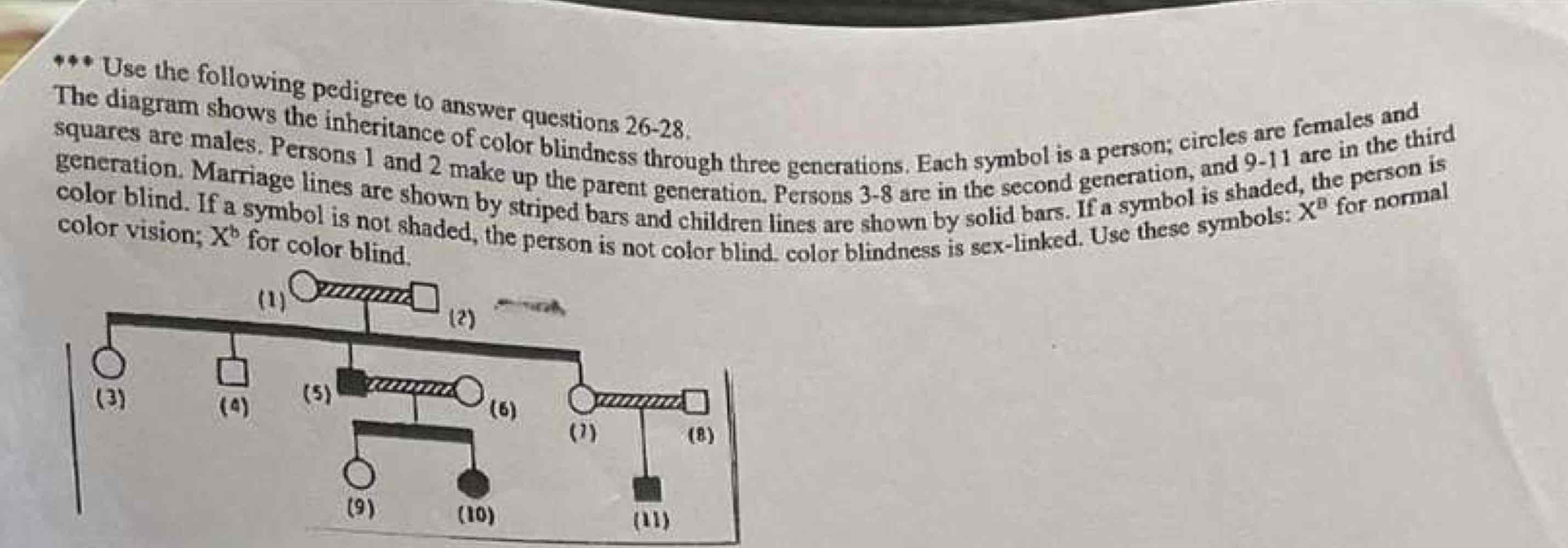
USE PEDIGREE CHARTS TO ANSWER QUESTIONS #26-28
What is the genotype of individual #1?
c) X^BX^b
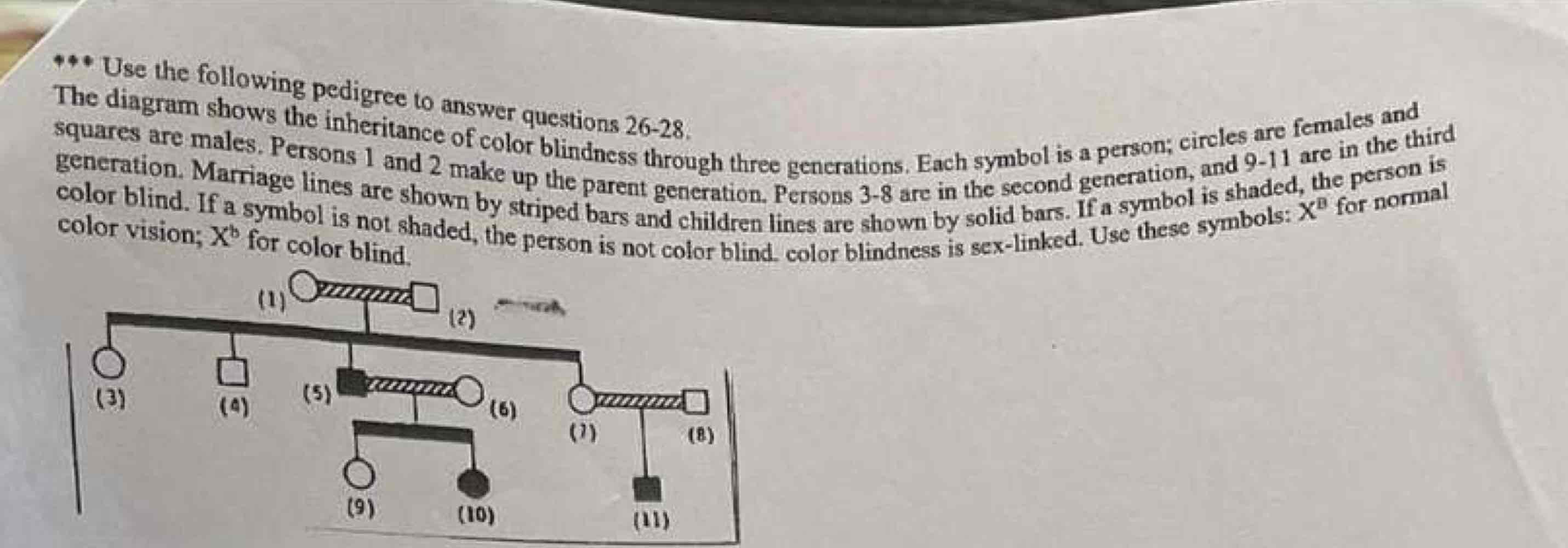
USE PEDIGREE CHARTS TO ANSWER QUESTIONS #26-28
What is the genotype of individual #5?
b) X^bY
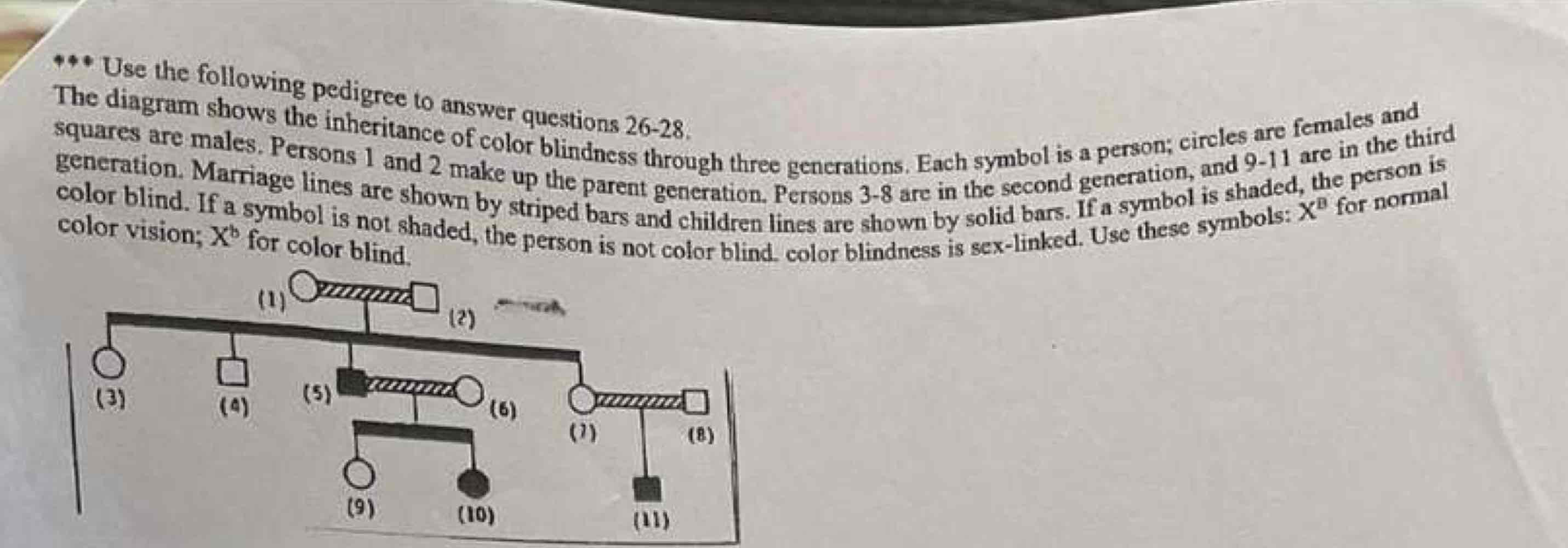
USE PEDIGREE CHARTS TO ANSWER QUESTIONS #26-28
What is the genotype of individual #6?
a) X^BX^b

*USE THE FOLLOWING INFO TO ANSWER QUESTIONS #29-31
Which traits are dominant?
b) normal and straight

*USE THE FOLLOWING INFO TO ANSWER QUESTIONS #29-31
If two ebony flies with curly wings are crossed, what percentage of their offspring will be expected to have ebony bodies and straight wings?
d) 100

*USE THE FOLLOWING INFO TO ANSWER QUESTIONS #29-31
A fly with the genotype NNSs is crossed with a fly with a genotype NnSs. What fraction of their offspring are expected to have the genotype NNss?
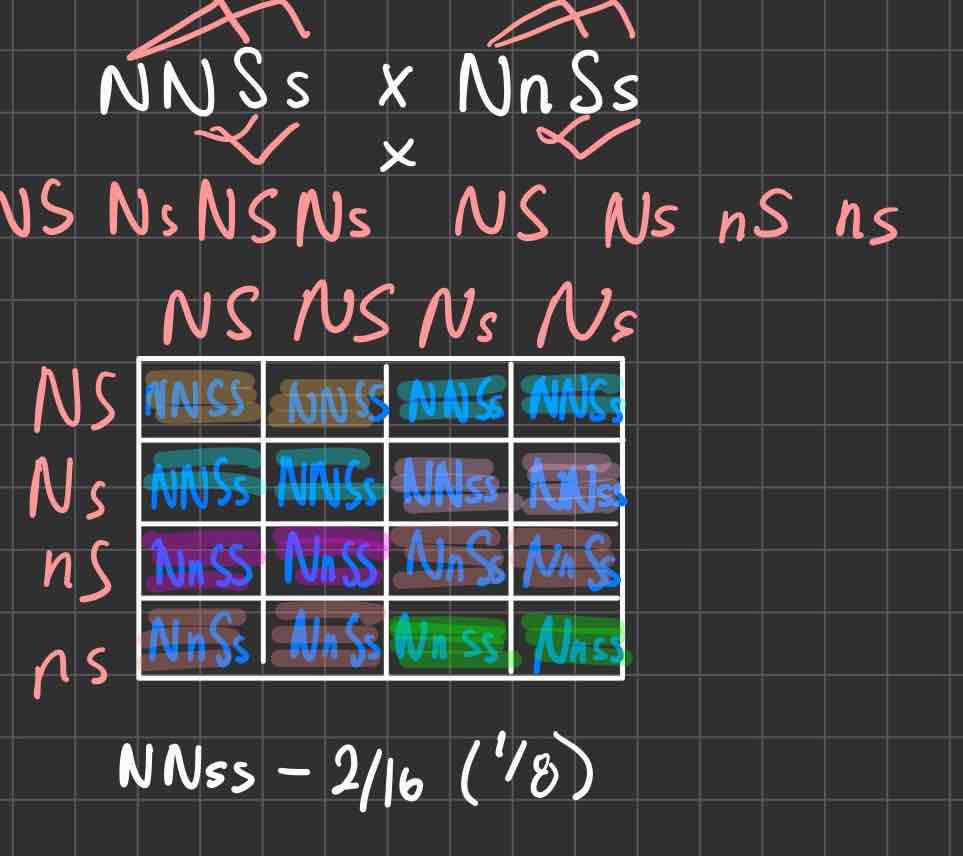
Normal mitotic cell division results in each daughter cell’s having:
b) the same number and kinds of chromosomes as the parent cell

** USE THE FOLLOWING INFO TO COMPLETE STATEMENTS #33-36
Both a man and his wife are color-blind. The chance that their first-child will be a son with normal vision is:
d) 0

** USE THE FOLLOWING INFO TO COMPLETE STATEMENTS #33-36
A girl with normal vision has a color-blind father. If the girl marries a color-blind man, the chance of them having a color-blind son is:
c) 100% (woman is carrier for color blindness, came from mom)

** USE THE FOLLOWING INFO TO COMPLETE STATEMENTS #33-36
A female heterozygous for normal color vision marries a color-blind male. The chance that a daughter will have normal vision is:
b) ¼

** USE THE FOLLOWING INFO TO COMPLETE STATEMENTS #33-36
A color-blind female marries a normal male. The expected phenotypic ratio among their offspring is:
d) ½ females w/ normal vision; ½ color-blind males
In meiosis, the chromosomes replicate:
d) once, and there are 2 cell divisions
The presence of three sex chromosomes in a person’s cells is best explained by:
d) trisomy
Linked genes do not assort:
a) independently
Which human blood genotype represents co-dominance?
a) I^AI^B
When round squash is crossed with long squash, all offspring are oval in shape. How many genotypes are produced when round squash are crossed with oval squash?
b) 2
Which event occurs during interphase?
a) the cell grows
Which statement about mitosis is CORRECT?
a. Two nuclei are always formed in this process
b. Xylem, nerve and muscle tissue continue dividing rapidly once they are formed
c. It takes about the same amount of time in all cells
d. It only occurs in the embryonic stage
c) It takes about the same amount of time in all cells
If the DNA code for the amino acid arginine is GCA, the mRNA codon for arginine is:
a) CGU
If the DNA code for the amino acid cysteine is ACA, the tRNA codon for cysteine is:
a) ACA
If the DNA code for the amino acid valine is CAA and for the amino acid glycine is CCT, then the correct mRNA sequence for valine and then glycine is:
b) GUUGGA
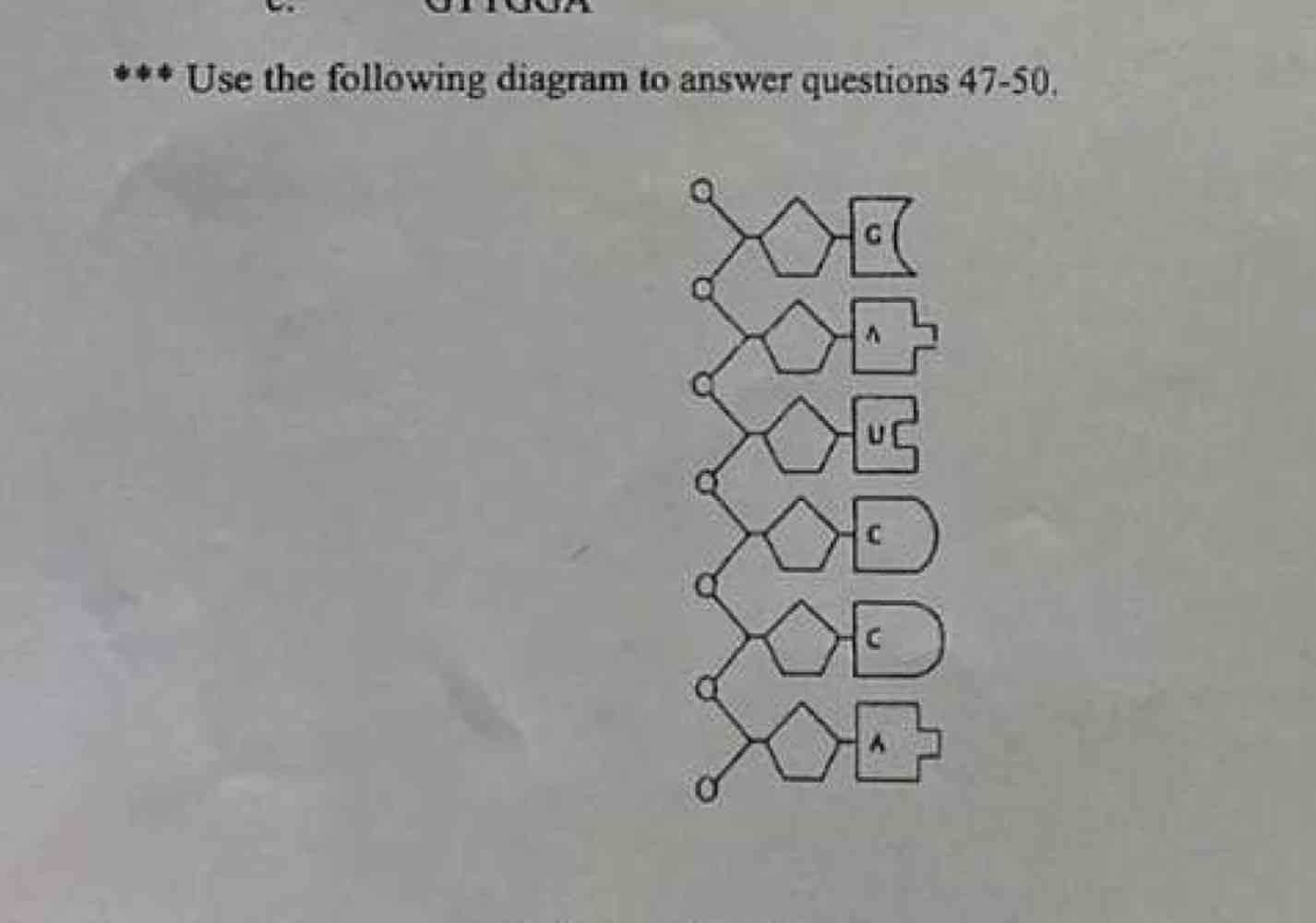
***USE THE FOLLOWING DIAGRAM TO ANSWER QUESTIONS #47-50
The diagram represents a portion of a ________ molecule.
a) mRNA
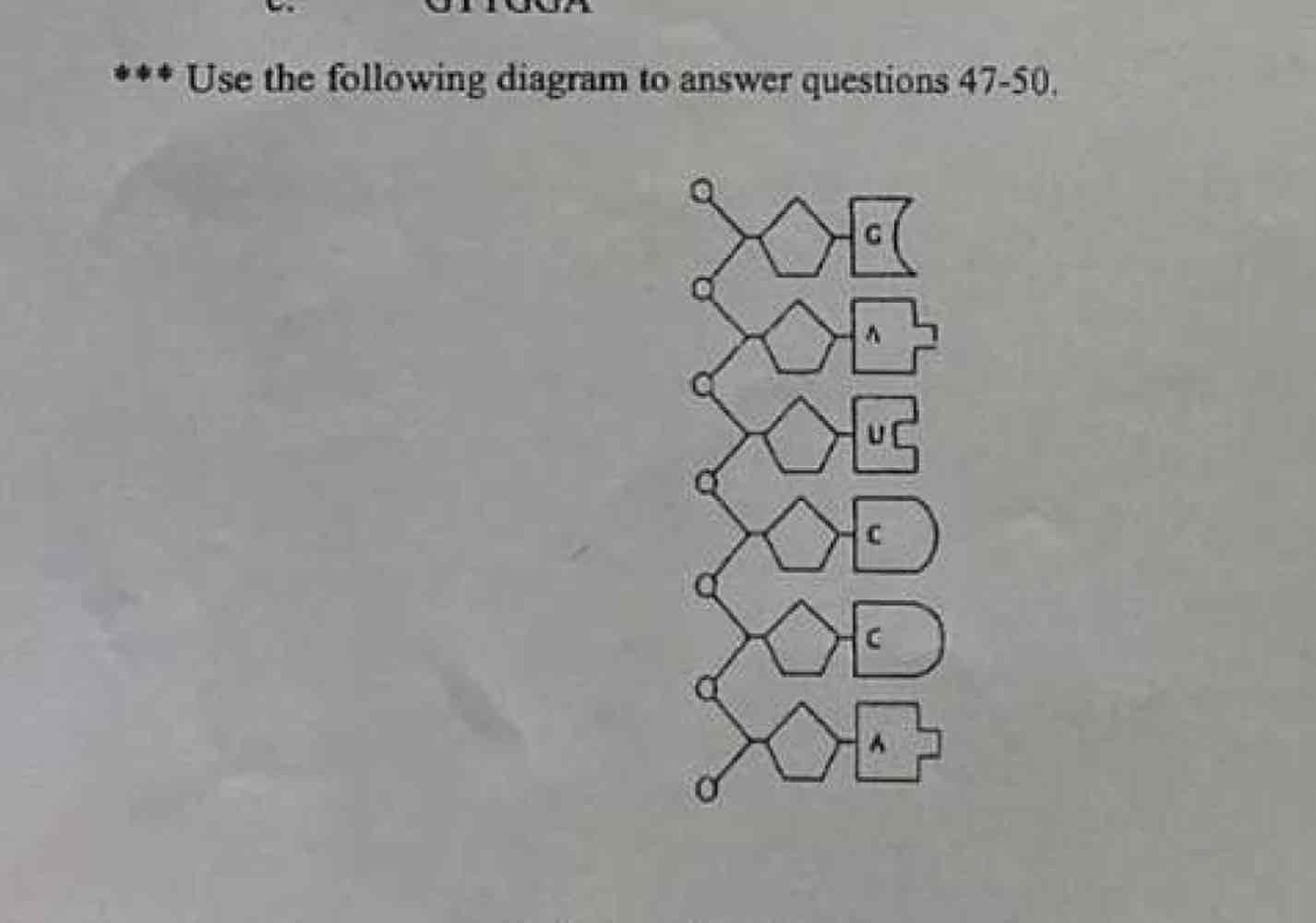
***USE THE FOLLOWING DIAGRAM TO ANSWER QUESTIONS #47-50
The lettered parts of the diagram represent:
b) bases
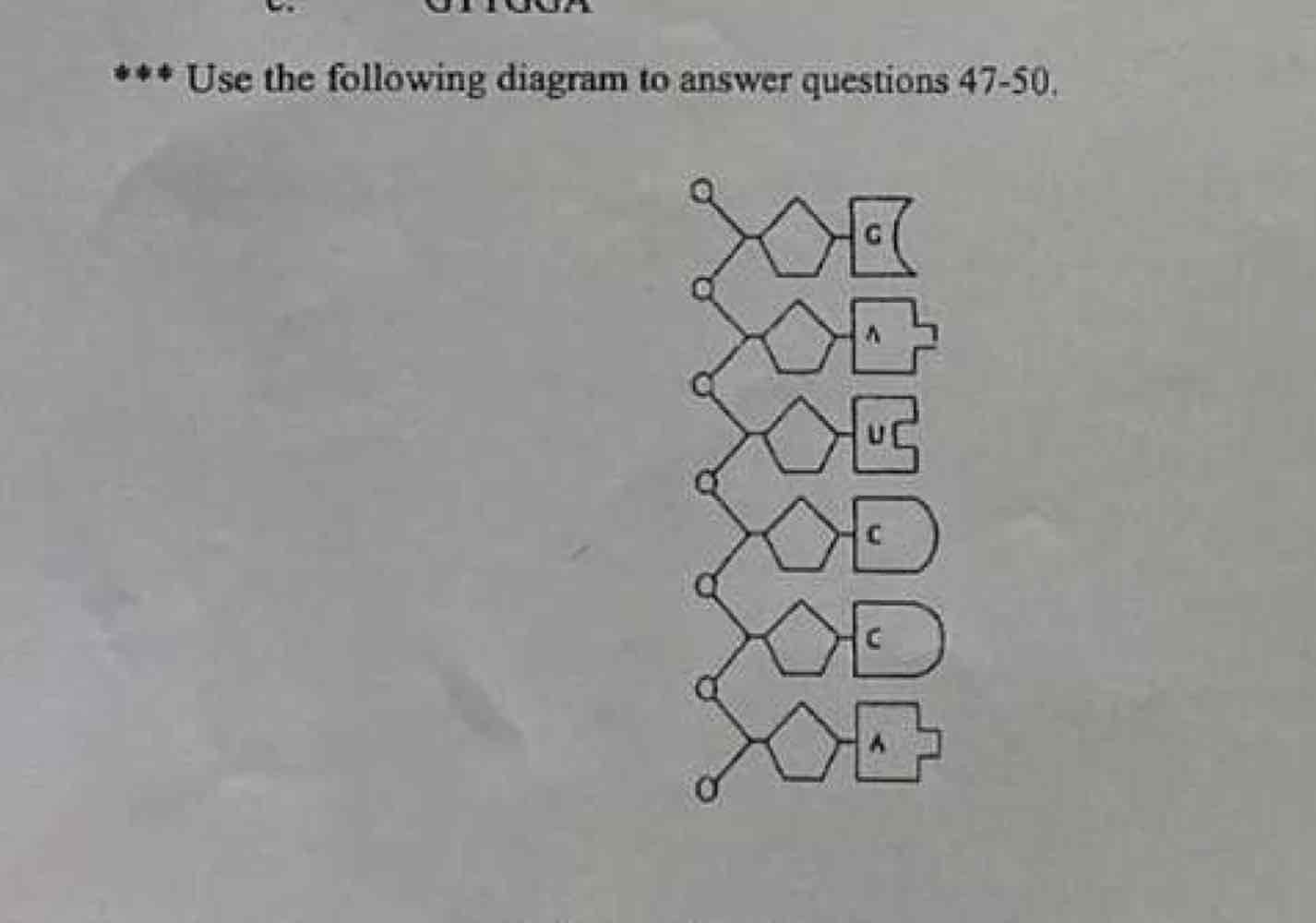
***USE THE FOLLOWING DIAGRAM TO ANSWER QUESTIONS #47-50
The pentagon-shaped (5 sided) parts represent:
c) deoxyribose
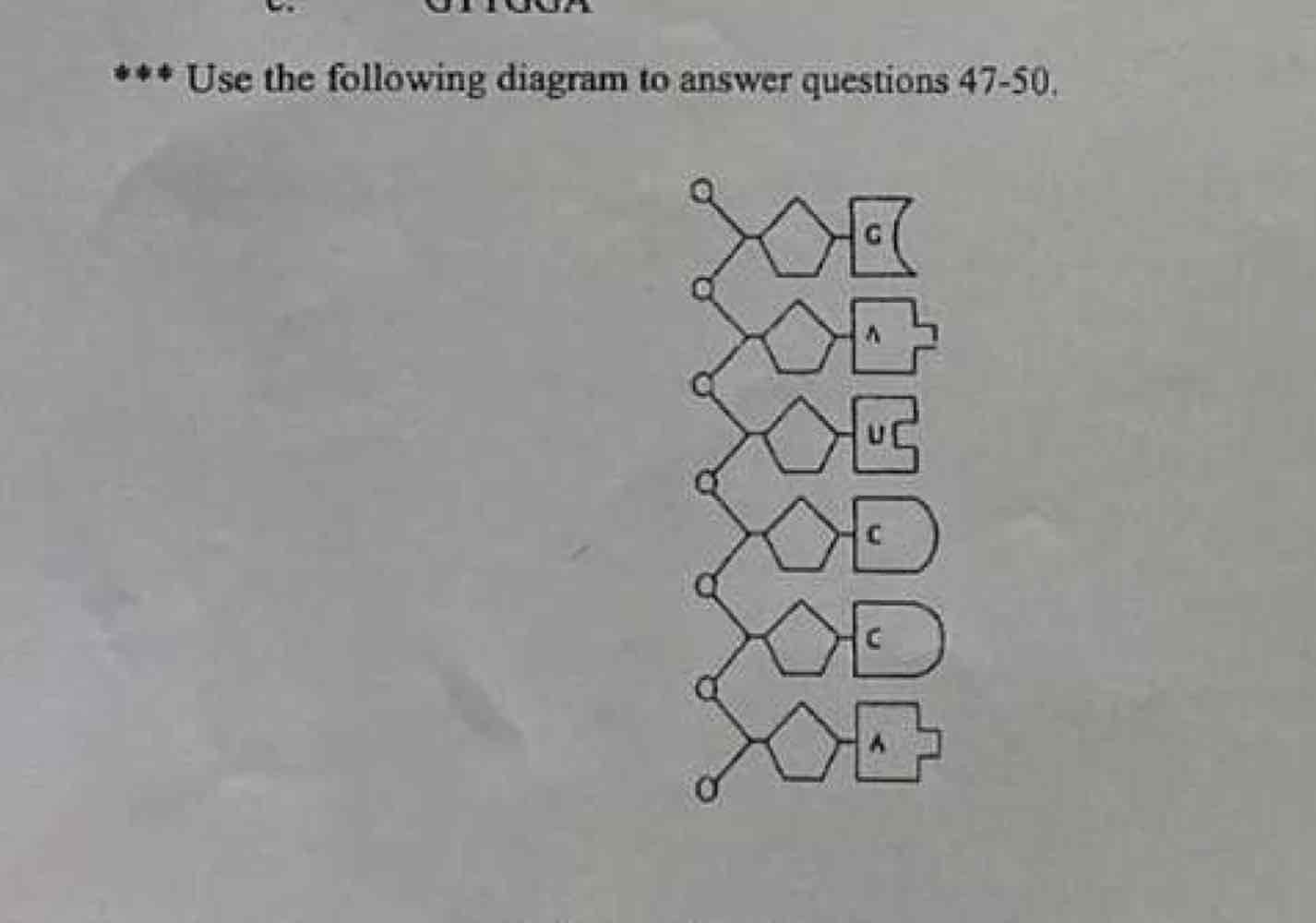
***USE THE FOLLOWING DIAGRAM TO ANSWER QUESTIONS #47-50
A connected circle, pentagon, and lettered part together represent a:
a) nucleotide